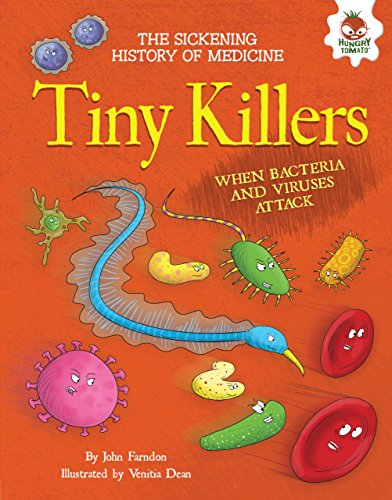-
Tiny Killers: When Bacteria and Viruses Attack
John Farndon, Venitia Dean
Paperback (Hungry Tomato ®, Jan. 1, 2017)Invisible microbes cause sickness by invading our bodies and multiplying. But doctors didn't always know that sickness was caused by germs. Most people thought diseases came from smelly, damp air. But over time, those ideas changed. A Dutch scientist saw bacteria through his microscope. Doctors realized that when they washed their hands, fewer people died. And a doctor in London recognized that disease could spread through contaminated water. Because of these discoveries, people eventually learned that hygiene was the key to stopping disease. Hospitals used clean surgical instruments, and cities developed trash removal and sewage systems. Learn more about the discovery and defeat of bacteria! X
X
-
Tiny Killers: When Bacteria and Viruses Attack
John Farndon, Venitia Dean
eBook (Hungry Tomato ®, Jan. 1, 2017)Invisible microbes cause sickness by invading our bodies and multiplying. But doctors didn't always know that sickness was caused by germs. Most people thought diseases came from smelly, damp air. But over time, those ideas changed. A Dutch scientist saw bacteria through his microscope. Doctors realized that when they washed their hands, fewer people died. And a doctor in London recognized that disease could spread through contaminated water. Because of these discoveries, people eventually learned that hygiene was the key to stopping disease. Hospitals used clean surgical instruments, and cities developed trash removal and sewage systems. Learn more about the discovery and defeat of bacteria! V
V
-
Tiny Killers: When Bacteria and Viruses Attack
John Farndon, Venitia Dean
Library Binding (Hungry Tomato ®, Jan. 1, 2017)Invisible microbes cause sickness by invading our bodies and multiplying. But doctors didn't always know that sickness was caused by germs. Most people thought diseases came from smelly, damp air. But over time, those ideas changed. A Dutch scientist saw bacteria through his microscope. Doctors realized that when they washed their hands, fewer people died. And a doctor in London recognized that disease could spread through contaminated water. Because of these discoveries, people eventually learned that hygiene was the key to stopping disease. Hospitals used clean surgical instruments, and cities developed trash removal and sewage systems. Learn more about the discovery and defeat of bacteria! X
X